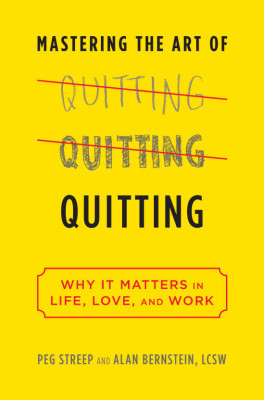The last two weeks have been rather crazy – lots of stress, some tears, and a lot of late nights at the office. I haven’t had nearly as much time to read as usual, but tonight I finally finished my latest book, and I really loved it!

I first heard about Mastering The Art of Quitting: Why It Matters in Life, Love, and Work when I read about it in Tess Vigeland’s Leap, which I read last year. But just like Leap, Mastering the Art of Quitting isn’t just for people looking to quit their jobs (or their relationships, or life). It’s a really insightful look into the social psychology behind human persistence. Why do we set goals in the first place, and then why do we stick with them (even when they’re no longer important to us)? Is quitting really a bad thing, or is it just that society tells us that anyone who quits is a loser? Mastering the Art of Quitting hooked me from the first example (which I wrote about on Monday), and it continued to intrigue me with its many social psychology studies and examples that demonstrate why, maybe, quitting isn’t such a bad thing.
I really enjoyed every chapter in the book, but it was tonight while reading the final few chapters that I hit on some really amazing quotes that are making me think:
“If reaching our goals doesn’t make us happy, what does? It’s whether our goals reflect the self. As Emmons writes, “people are more than just collections of personal goals. What’s missing is an overall organizing principle that brings together and integrates separate goal strivings into a coherent structure. . . . This is the job of identity or the self, creating an overall life purpose. This organizing principle— be it identity, the self, or a similar structure— is that which links individual goals together and to future states and desired outcomes.””
Goal setting is really important to me, and with some of my goals failing recently, it’s been interesting to see which ones hit me the hardest – and this book made me see that perhaps that’s simply a construct of how I define myself. The authors go on to cite the fascinating work of Patricia Linville, who coined the model of self-complexity. Linville notes that “the more complex our self-representation, the more buffered we are from negative affect and emotional fallout” – which essentially means that if you have multiple goals that are equally important to you, you can fail at one without it hurting your self-esteem quite as much as if you had only one goal and you failed at it.
Mastering the Art of Quitting goes into a lot of principles of happiness, and I found it really intriguing that 40% of our happiness is determined by intentional activity – so that is to say, how hard we feel like we’re working at the things that matter to us. This explains why lottery winners aren’t necessarily the happiest people in the world, and also emphasizes that you need to not only choose appropriate goals that match your values, but also that working hard at them is what’s going to make you the happiest.
I thought the book was best summed up with the following quote:
“This book doesn’t promote quitting as a stand-alone answer. If quitting isn’t accompanied by engagement with new goals, it’s not an answer at all. In a celebrity -obsessed culture that focuses on extrinsic goals— chiefly, money and fame— perhaps our job as people, parents, and mentors is to focus less on the value of persistence and more on the nature of the goals we set for ourselves and encourage in others.”
I’m so glad that I happened to pick up Mastering the Art of Quitting, and even more glad that it turned out to have a much broader focus on goal setting as a whole rather than just focusing on quitting. This may have been a tough week and I am totally ready for Mexico, but I’m also not ready to quit – and I think all this talk of goal setting is putting me in exactly the right mindset for a vacation this weekend that’s both relaxing and energizing – inspiring me to come back stronger than ever.

I’m super intrigued by this book. I really enjoy reading about why we do what we do, and what we can do to be better.
I really recommend it!